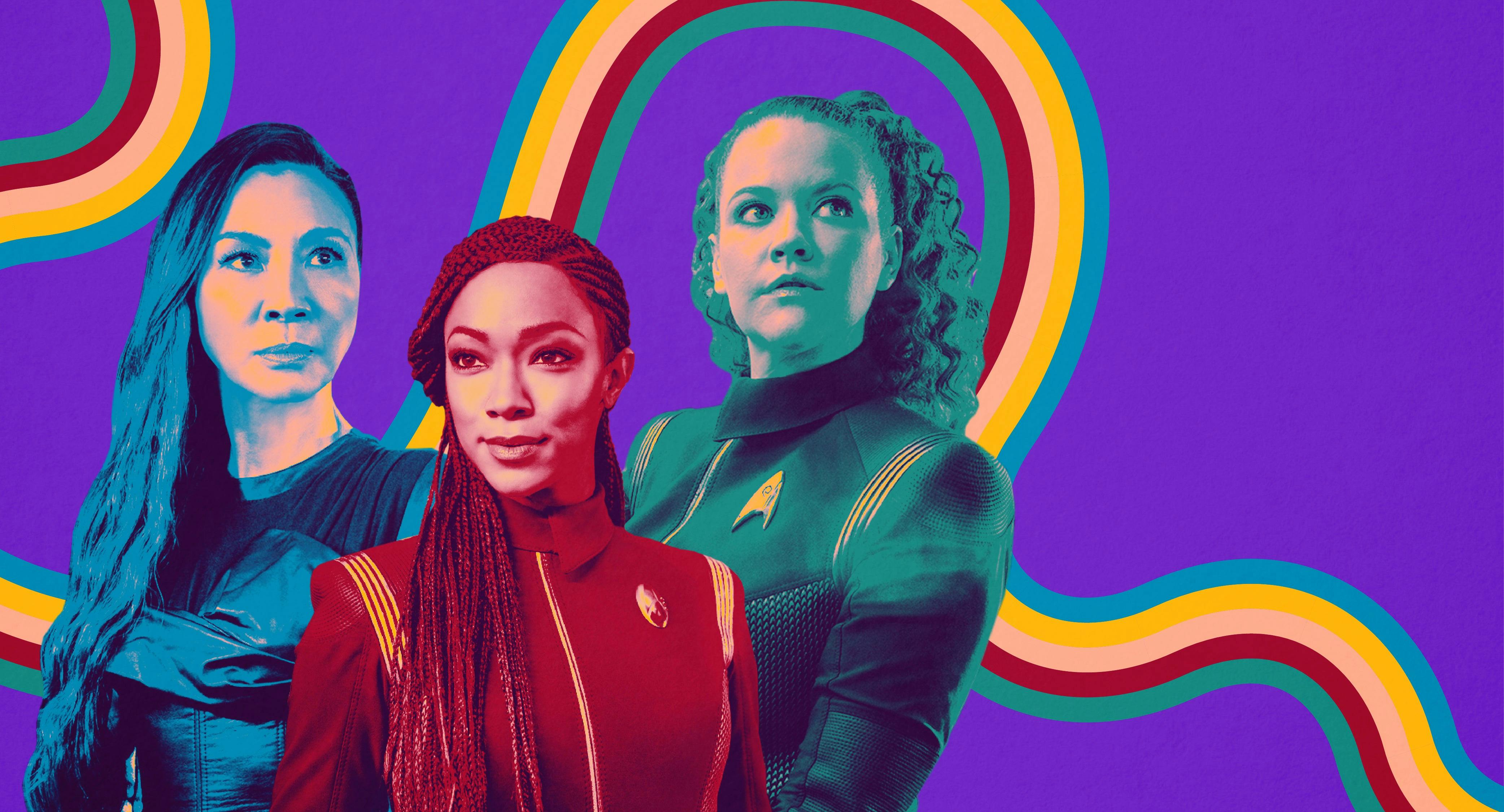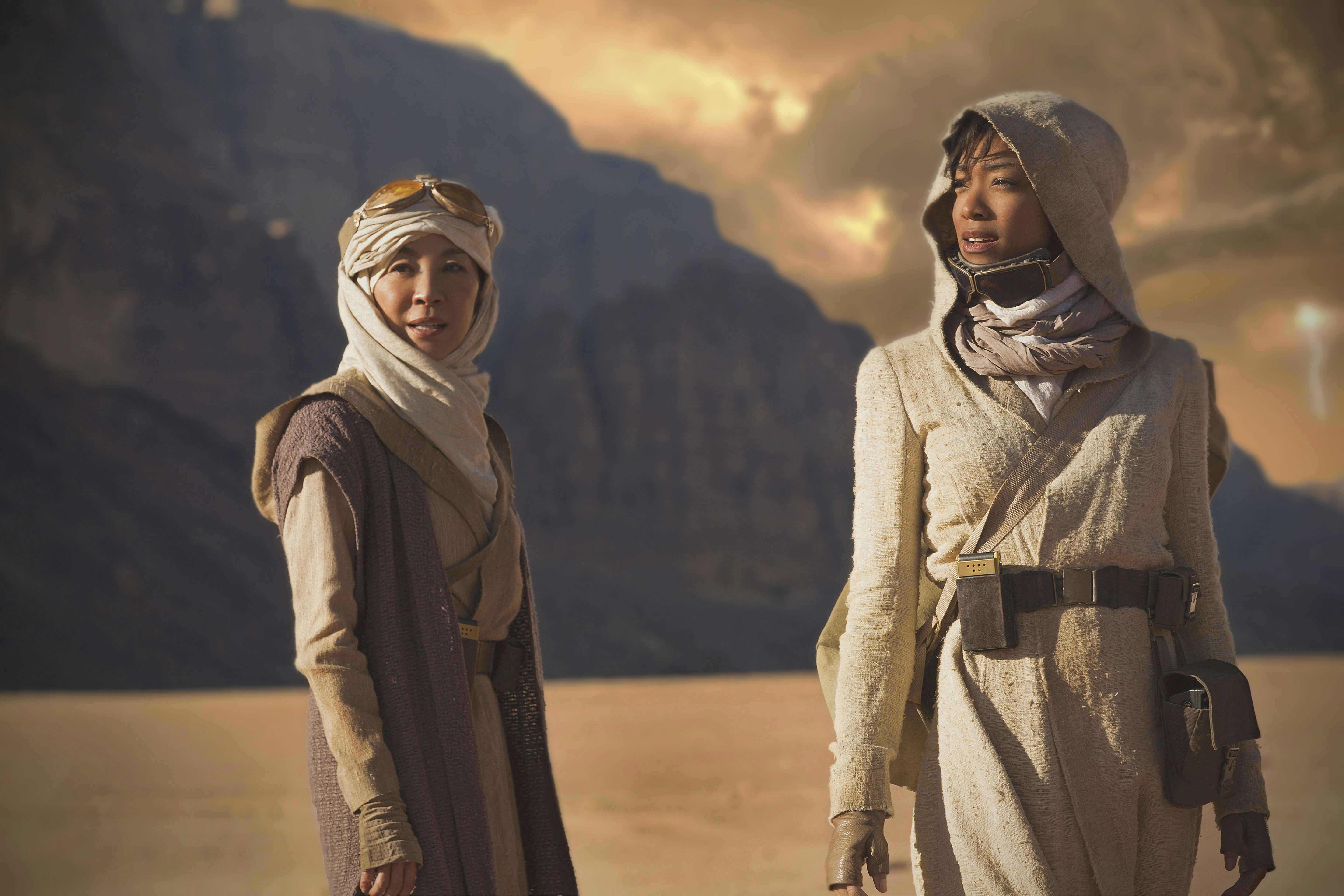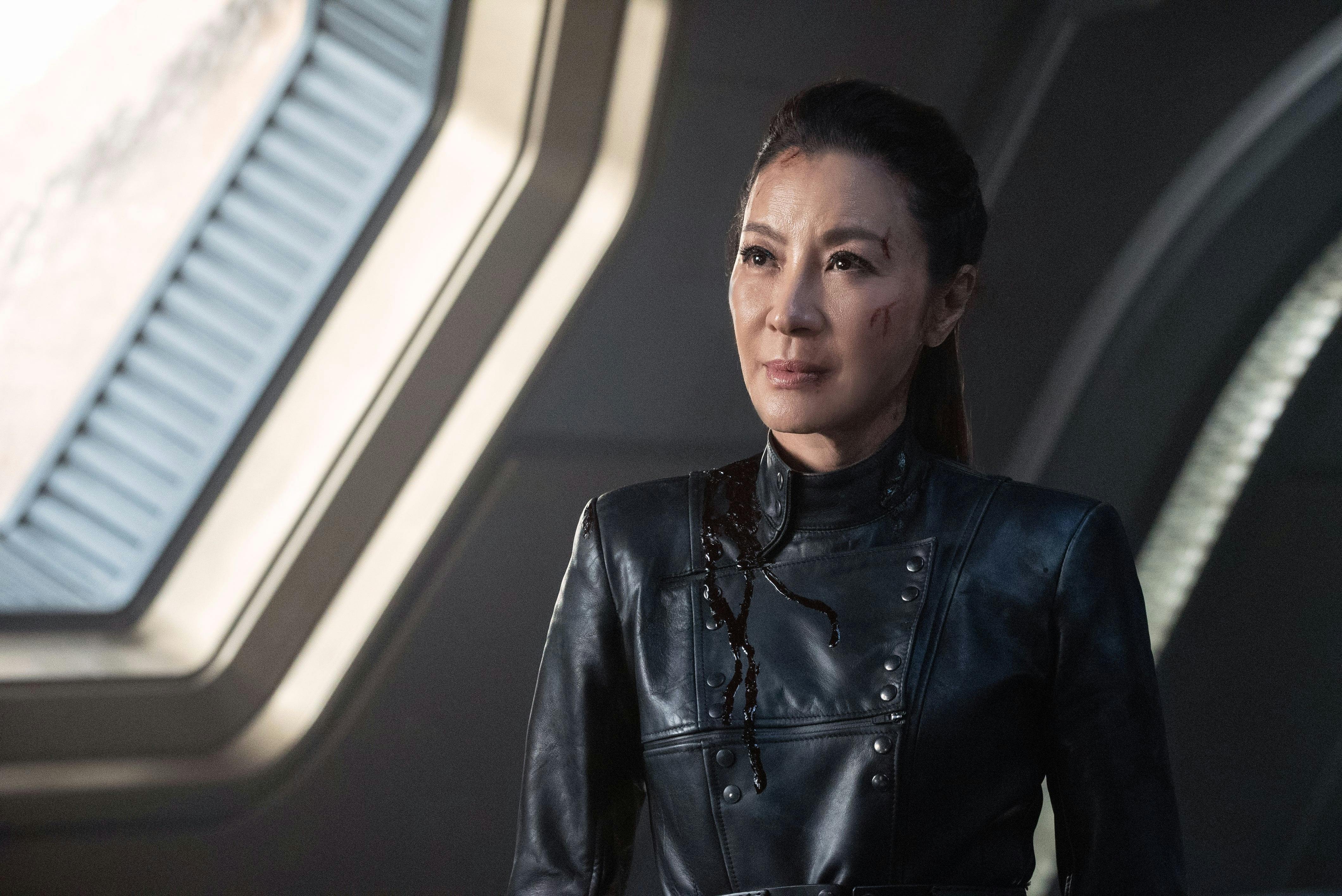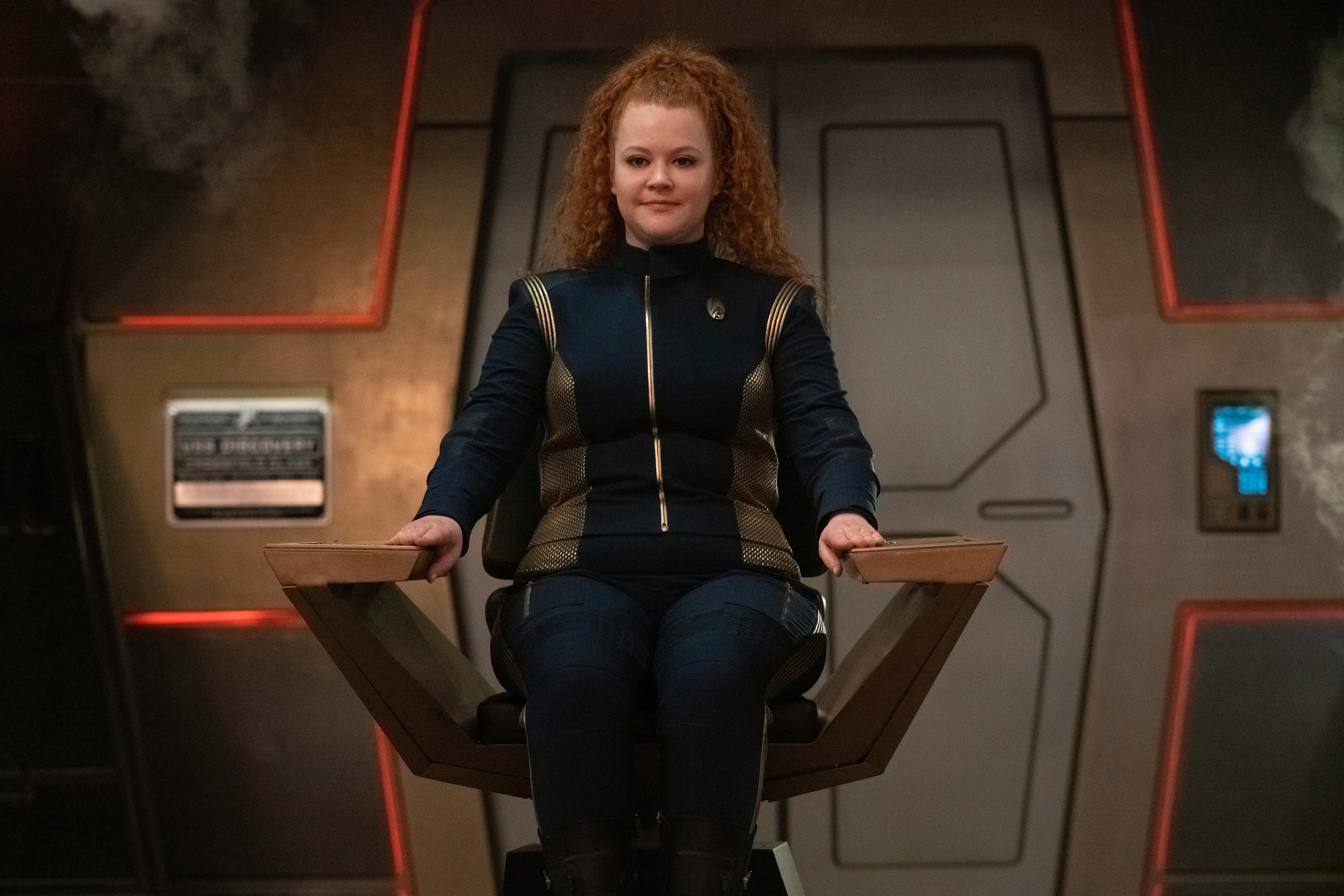Published Jul 30, 2021
How the Women of Discovery Helped Heal My Son
Discovery's focus on strong women paid unexpected dividends for one single father and his son.

StarTrek.com
When my son was born in 2008, one of the things I most looked forward to about fatherhood was sharing my favorite pop culture experiences as he got older. Some of my fondest memories of my own childhood could be traced back to the small bonding moments I had with my father while watching his favorite shows with him. This was especially true during the years after he started his own business, and worked such long and arduous hours that those moments were sometimes our only chance to spend time together in the evenings. So, even when my son, Hunter, was an infant, I was already scrounging the internet, looking for DVD sets of shows from my childhood like DuckTales and Teenage Mutant Ninja Turtles.
Mostly, though, I couldn’t wait to share Star Trek with him. I grew up with The Next Generation, watching Captain Jean-Luc Picard lead the crew of the Enterprise-D through tricky, complex and even dangerous missions on a weekly basis, succeeding more often than not through diplomacy, cultural or scientific understanding, and mutual respect. Those were lessons I was eager to pass on to my child.
By 2014, I was a single father. My son’s mother is still around, but she lives very far away and is only allowed to see our child under very specific, court-ordered circumstances. Hunter’s early years were dominated by the physical and emotional trauma inflicted upon him by his mother over the course of a lengthy and painful custody battle. By the time I was granted full custody and allowed to move out of the state, Hunter’s perception of his mother and women, over all, was severely damaged. He had become distrustful and dismissive of women in positions of authority such as teachers. It was a disheartening (if unsurprising) development; our relationships with our parents often play an important role in determining how we perceive and interact with others in life. I made little progress in rectifying his damaged perceptions, though I tried every suggestion and course of action offered by professionals and well meaning parent-friends. But, parenting is tough even under the best of circumstances; none of us are given a handbook on how to do it properly, and it only gets tougher when you’re on your own.

startrek.com
Things started to change when the first season of Star Trek: Discovery aired in 2017, a few months before my son’s 10th birthday. While I was excited beyond measure for the first new Trek series in more than a decade, Hunter, despite his growing love of the franchise over the previous few years (particularly his fascination with Lt. Commander Data), was decidedly lukewarm about this new series. It wasn’t particularly mysterious to me as to why – Discovery debuted with not just one, but two lead female characters in First Officer Michael Burnham and Captain Philippa Georgiou. Up to that point, we’d watched a lot of TheOriginal Series movies, and most of The Next Generation — rather male dominated series, with women as series regulars, but not in positions of obvious power to young eyes. My son was accustomed to watching strong, intelligent men solve the galaxy’s problems, and didn’t seem particularly interested in seeing a woman replacing the likes of Kirk and Picard.
That all began to change with the episode “The Butcher’s Knife Cares Not for the Lamb’s Cry,” when Michael is tasked with finding a way to weaponize a captured alien creature known as Ripper, a strange and seemingly dangerous animal the Discovery crew found in the lower decks of their now-destroyed sister ship, the U.S.S. Glenn. Captain Lorca, looking for any advantage in the war, demands Michael turn Ripper into a weapon at any cost, up to and including killing Ripper and harvesting any useful biological components. Instead, Michael first seeks scientific understanding of the creature, leading to the realization that Ripper is not only not a threat, but the key to utilizing Discovery’s newly-developed Spore Drive. This breakthrough allows Lorca and the Discovery to instantly jump to the mining colony of Corvan II, saving hundreds of lives in the process and ultimately turning the tide of the war. Eventually, realizing Ripper is sentient and that using it to power the Spore Drive’s navigational systems is causing it irreparable harm, Michael defies orders in defense of Ripper’s life, ultimately succeeding and freeing the animal to once again travel the stars.
My son has been an animal lover since his earliest days, the kind of child who frets even when you step on a bug. Watching Michael not only solve a complex problem, and save hundreds of lives, but do so while showing empathy and respect for this strange interstellar bug, all in one fell swoop, was an eye-opening moment for him — one he talked about for days after. The events of this episode may seem small and insignificant in comparison to some of the bigger moments in Trek history, but through them Michael earned my son’s respect in a way that Kirk and Picard never really had to, and Hunter’s excitement for each new episode steadily grew.
Over the course of three seasons now, Discovery has continued to introduce strong women in key positions that further solidified their earned place among both the crew of the Discovery, and Star Trek in general. I watched and cheered along with my son as ace pilot Keyla Detmer flew Discovery through several perilous battles, and even into the future. We watched as Tilly’s friendship with Michael blossomed, giving Tilly the confidence to overcome her insecurities and rise through the ranks to a place of leadership and trust among her crew. We spent a good deal of time talking about Philippa as well, as she constantly fought to overcome the darkness within her Terran side and become Discovery’s watchful protector, taking on the most dangerous missions without second thought for her own personal safety, and generally kicking ass in ways that have traditionally been the sole purview of the Hollywood’s most dashing leading men.

StarTrek.com
It was Philippa’s bravery, and combat efficiency, in the Season 3 episode “Far From Home” that ultimately made me realize what a positive impact these women were having on my son. With Saru and Tilly held hostage by rogue courier Zareh and his henchmen on a barren, icy planet, Philippa allows herself to be captured as a means of infiltrating their location. Zareh, incredulous, inquires if a “one person tactical response” is the best the crew of the Discovery can muster.
It was at this point that son surprised me as he nearly jumped from his seat, shouting, “YOU DONE F***ED UP, NOW!”
I was so caught up in the moment I let the profanity slide as Georgiou quickly and elegantly incapacitated several armed men. Perhaps not my best parenting moment, but the realization that my son had come to see Philippa the same way he sees a superhero like Batman brought a smile to my face.
Because it was then that I realized what a profound impact Discovery was having on my son, simply by normalizing women in roles of authority, with their own agency, in ways he’d never encountered in science fiction. In that way, Discovery has become a wonderful example to me of why representation in media matters. Representation normalizes things; it makes them relatable, understandable, and more agreeable. The more often we see something as part of ordinary, everyday life, even in fictional media, the more likely we are to accept and even expect it. Seeing these women in genuine leadership roles means a great deal, and while Star Trek has been more progressive than most media franchises in this regard, they’ve really done the work to make it a fundamental part of the Discovery experience.
When Gene Roddenberry first conceived of Star Trek, his vision was one of a utopian society that had moved beyond not only our base materialistic needs, but had also evolved beyond the old tribal divisions of nationality, gender, race, and personal identity. With Discovery, I think Star Trek has moved far closer to that vision than ever before, and I’m thankful it’s become a regular part of my son’s formative years. It is easy, as we get older, to forget how influential TV and movies can be in helping us as growing children to define our own identities, as well as our perception of the world in general.

StarTrek.com
Star Trek, at its best, is about inspiring us to better ourselves and each other through mutual empathy, understanding, and acceptance. I am grateful to have been able to grow up with role models as wonderful as Jean-Luc Picard. I am even more grateful that, 30 years later, my son can grow up with Michael Burnham, Sylvia Tilly, and Philippa Georgiou.
10 Women in Command Who Paved the Way for Kathryn Janeway
Ryan Hartmann (he/him) is a writer and freelance journalist who has covered the technology and gaming industries for over 20 years. He lives in Colorado with his 12 year old son.
Star Trek: Discovery streams on Paramount+ in the United States, airs on Bell Media’s CTV Sci-Fi Channel and streams on Crave in Canada, and on Netflix in 190 countries.
